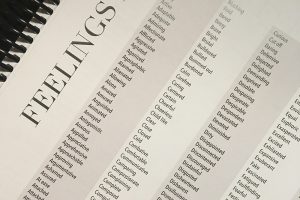
Having a better emotional vocabulary helps you identify what you are actually feeling. The feeling of “powerful” is going to drive a lot different action than feeling “good.” So when someone asks you how you are doing today…. how do you want to answer? “Fine?” “Good?” “Hanging in there?” or do you want to be “Awesome?” “Amazing?” “Confident?” “Productive?” How you answer could be the key to feeling exactly how you want to feel.
Show Notes:
Follow Amanda on Facebook and Instagram.
Join Amanda’s Private Facebook Group.
You can find Celeste Davis here:
MarriageLaboratory
Facebook
Instagram
Podcast
Show Summary:
As our brain has evolved, so have our emotions. All of our emotions are caused by our thoughts. All of them. Sometimes the thoughts are conscious and sometimes they are unconscious thoughts, but our thoughts is what causes our emotions. So as our brain has evolved and our thinking has become more sophisticated with the expansion of language, so have our emotions.
Have you noticed when you are reading a book how the author uses so many emotions to describe what’s happening in the book and it creates those emotions in you as well.
Or what about when you go see a movie and just sitting there watching you are happy, and sad, and scared, and surprised, and nervous, and disappointed, and elated? It’s your thoughts about what you are watching that are creating those emotions in you.
I went to a movie last week with my husband. He picked the movie. It was about an old man who robbed banks. From my perspective (or my thoughts) the movie didn’t have a lot of action. It was pretty slow. I was actually quite bored most of the time. My husband had completely different thoughts about it. He thought it was very thought provoking and exciting. Same movie…different thoughts and different emotions.
I have a daughter who is bipolar. Especially when she was younger she seemed to go from calm to rage in about 2.3 seconds. Sometimes for very unknown reasons (at least from an outside perspective) the rage would come out of nowhere.
With the help of her therapist, we worked a lot on helping her identify all of the emotions she was actually experiencing to help her calm herself down a lot faster. In a matter of moments she would go from disappointment to frustration to embarrassment to anger and then to rage. All of those emotions were created by thoughts that were unconscious and going very quickly through her brain.
But helping her learn the vocabulary of emotions helped her understand what she was feeling and either not go to rage at all, or at least a lot slower as she understood and put words to what she was actually feeling.
I had one of those posters hanging up with all the faces expressing different emotions and after an incident with her we would go to the chart so she could identify and verbalize what she had actually been feeling. Putting a word to the emotion helped her FEEL it better. As she got better at identifying what emotions she was actually feeling, the rage didn’t happen near as often.
Primary and Secondary Emotions
First I would like to talk about primary emotions. If you remember the movie Inside Out, it identified 5 primary emotions
- Joy
- Anger
- Sadness
- Fear
- Disgust
There are differing views on what the primary emotions are. Most agree that Happiness/Joy, Anger, Sadness, and Fear are 4 and some add surprise and or love onto that list. One list I saw boiled it down to two primary emotions Love/Rejection. Positive emotions all stem from love and negative emotions all stem from rejection.
It really doesn’t matter how you look at it, but just knowing there are primary emotions and then there are secondary emotions helps us understand emotions better. Also understanding that there is a spectrum of emotions helps us understand them better.
For example:
- Primary Emotion: Sadness
- Secondary Emotions: Disappointment, Shame, Neglect, Sympathy, Lonely, Isolated, Abandoned, Despair, Guilt, Hurt, etc.
Having a bigger vocabulary for emotions helps us understand what we are feeling better. I have a list hundreds of different emotions that I pull from when I am working with my clients.
When we can truly dial in to what we are feeling and understand how that emotions feels in our body, understand what thought is making us feel that emotion, then and what kind of actions we take from those emotions, then we can truly have power over the results we are getting in our life.
For example what is the difference between sad, disappointed, and hurt? How does differentiating those three emotions change how you act?
Also realizing that a lot of people experience emotion differently. If people don’t have the vocabulary for it, they may describe things differently than you do or you may be describing the same emotion and feel it very differently and it creates different actions and results for each of you.
It’s interesting to note how different cultures around the world or even in different family cultures some emotions are more common or taught differently. Sometimes emotions aren’t taught at all. Sometimes they are taught to be suppressed.
Think about how there are families you know or maybe you’ve seen in books or movies where boys are taught that they can’t cry. They can’t be sad. They have to be tough. What kind of results are they having in their life? Now think about a family or a book or a movie where children are taught that all emotions are ok. That it’s ok to feel. What kind of results are they having in their life?
What do you want to feel?
When I’m working with my clients and we are running through models I will ask them what the thought they are thinking makes them feel. I can’t tell you how many times they say “good” or “bad” So we have to dig deeper and put a vocabulary on what they are actually feeling.
- Are they feeling good? or are they feeling content, proud, accepted, powerful, optimistic, joyful, free, successful, confident, respected, valued, or hopeful?
- Are they feeling bad? or are they feeling scared, anxious, insecure, rejected, helpless, overwhelmed, worried, inadequate, worthless, or insignificant?
Do you see how having a better vocabulary helps you identify what you are actually feeling? The feeling of “powerful” is going to drive a lot different action than “good”
I ask my clients to tell me the top three emotions that they experience every single day. Then I ask them what they WANT to feel?
Think about when someone asks you how you’re doing and you respond with something like “I’m fine” or “I’m hanging in there.” When you say those words, that is creating those emotions in you. Is that what you want for your life? To be “fine” or “hanging in there?” I would challenge you to be very deliberate in choosing what you want to say about how you’re feeling because that’s going to create those emotions in your life. And those emotions are going to drive the actions that you give you results.
And I’m not saying it has to be all unicorns and roses all the time either. It doesn’t need to be all positive emotions. Sometimes we want to experience negative emotion. When my children are doing something that isn’t good for them I want to be sad or disappointed. When I am working on a project sometimes I choose to be disciplined and motivated and that doesn’t always feel good. But to create the results that I want in my life, those are the emotions that I need to have to drive those actions. So I need to think thoughts that are going to create those emotions of discipline and motivation for me.
Negative emotion isn’t bad. I think a lot of us don’t want to feel negative emotion so we buffer away those emotions, which ends up making us feel worse all together. What if we realized that negative emotion wasn’t bad? It was just part of life. It doesn’t need to be avoided. This life was meant to be 50/50 – you have to experience the negative to appreciate the positive. What if you could have positive emotion about having negative emotions?
Like my previous example – sometimes I need to be motivated or disciplined to accomplish something. That doesn’t always feel good. Sometimes it downright feels awful. But knowing that is how I NEED to feel to do what I truly want in life makes it so that I can have positive emotion about the negative emotion.
When my child makes a decision that I don’t like, sometimes I’m disappointed or sad. But knowing that he too needs to experience the bad in order to appreciate the good makes me happy. He’s getting the full life experience. The life he is supposed to have!
Emotions in Marriage
So, if we are going to CHOOSE how we want to feel…how do you want to feel in your marriage?
Do you want to feel frustration, anger, contempt, heartache, sadness, misery?
Or do you want to feel happiness, love, contentment, and peace?
All of those emotions are available to you. It all depends on the thoughts you have. You get to choose.
Your brain will offer you thoughts that make you feel irritated and frustrated. Maybe even angry or sad. But you get to choose whether you want to believe them or not. You can also purposely choose to think thoughts that bring you the emotions you WANT to feel. It’s really up to you.
So let’s say that your husband has an affair. Your brain is going to offer you thoughts like
- He shouldn’t do that
- If he loved me he wouldn’t have done that
- There’s something wrong with me
- If I was more lovable/sexy/thinner/curvier/etc he wouldn’t look elsewhere
Those kinds of thoughts will leave you feeling angry, frustrated, insecure, and resentful.
Now, I’m not saying that it’s not ok to feel those things. It is absolutely ok to feel whatever you want to feel. But I want to offer you some other thoughts that might bring some different emotions that you may want to feel instead.
- Him having an affair is about him and really has nothing to do with me
- I can love him even though he has done this and I will decide if I want to stay with him or not.
- I am amazing, beautiful, and talented. It’s too bad he can’t see that.
How would those thoughts make you feel? Empowered? Confident? I wouldn’t say those emotions feel great…but they feel a lot better than anger, frustration, insecurity, and resentment.
Emotions are really powerful. And they are powerful because your thoughts are powerful. Use that power to bring you what you really want in this life. You are totally capable of that.



